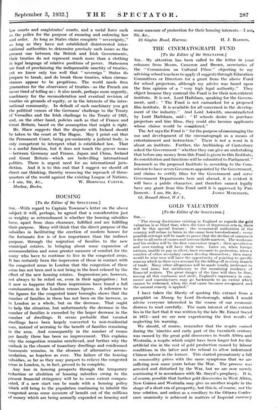HOUSING
[To the Editor of the SPECTATOR.] SIR,--With regard to Captain Townroe's letter on the above subject- it- will, perhaps, be agreed that a consideration just as weighty as retrenchment is whether the housing subsidies have, apart from slum clearance, fulfilled and are fulfilling their purpose. Many will think that the direct purpose of the subsidies in facilitating the erection of modern houses for the fortunate few is of less importance than the indirect purpose, through the migration of families to the new municipal estates, in bringing about some expansion of accommodation and some greater measure of comfort for the many who have to continue to live in the congested areas. It has certainly been the impression of those in contact with the congested areas in London that the congestion of these areas has not been and is not being in the least relaxed by the effect of the new housing estates. Impressions-are, however, not always to be relied on, even in their aggregation ; but it now so happens that these impressions have found a full corroboration in the London census figures. A reference to the figures for the congested inner boroughs shows that the number of families in these has not been on the increase, as in London as a whole, but on the decrease. That ought to help the situation, but unfortunately the decrease in the number of families is exceeded by the larger decrease in the number of dwellings. It seems probable that vacated dwellings have been largely converted to non-residential uses, instead of accruing to the benefit of families remaining in the area. And consequently in the number of rooms per family there has been no improvement. This explains why the congestion remains unrelieved, and further why the outlook in the closure of insanitary dwellings and condemned basements remains, in the absence of alternative accom- modation, as hopeless as ever. The failure of the housing subsidies, so far as they may purport to relieve the congested areas in London, is, in fact, proved to be complete.
Any loss in housing prospects through the temporary reduction • or abolition of housing subsidies owing to the present financial stringency will be to some extent compen- sated, if a new start can be made with a housing policy which will bring to the population continuing to inhabit the congested areas some measure of benefit out of the millions of money which are being annually expended on housing and






























 Previous page
Previous page